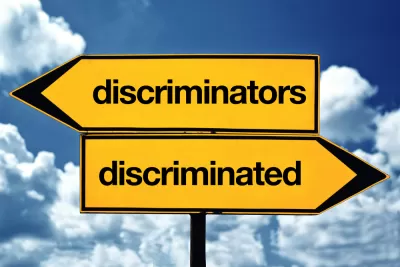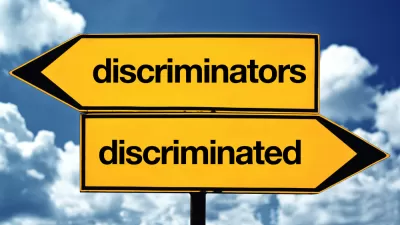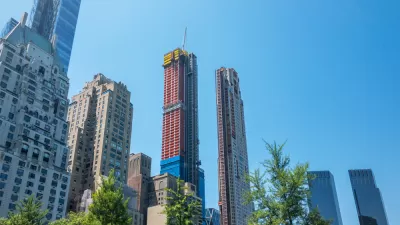Extell Development Company made news last summer by proposing a luxury development with a separate entrance for below-market-rate units. Now that the project is fully approved, New York councilmembers might expand anti-discrimination policies.

Bryce Covert reports, "Extell, which is building the 33-story complex, will build a specific door for the 55 affordable housing units it’s including in order to be allowed to build a bigger building. The low-income units, which are available to people making 60 percent of median income or less, will also be in a segment that only contains affordable apartments and that faces the street while the luxury apartments will face the river."
The problem is becoming more common as developers look to gain more square footage under the city's inclusionary housing allowances. According to Covert, "besides being made to use a separate entrance, some low-income residents in luxury buildings are prohibited from using the amenities offered to the wealthy tenants, which in the case of this particular building include swimming pools and regulation-sized basketball courts. Several buildings in the city ban affordable housing or rent-regulated tenants from using perks like gyms, rooftops, and pools, and the practice is on the rise."
The Department of Housing Preservation and Development approved the project, as first reported by Kate Briquelet for the New York Post. According to Covert, however, "New York City lawmakers have taken notice of all of this, and two council members are working on legislation that would expand the city’s anti-discrimination protections to include rent-regulated tenants. A state assemblywoman has introduced legislation that would require buildings to let low-income renters use all the amenities."
FULL STORY: Luxury Apartment Building Will Have Separate Door For Poor Residents

Planetizen Federal Action Tracker
A weekly monitor of how Trump’s orders and actions are impacting planners and planning in America.

Congressman Proposes Bill to Rename DC Metro “Trump Train”
The Make Autorail Great Again Act would withhold federal funding to the system until the Washington Metropolitan Area Transit Authority (WMATA), rebrands as the Washington Metropolitan Authority for Greater Access (WMAGA).

The Simple Legislative Tool Transforming Vacant Downtowns
In California, Michigan and Georgia, an easy win is bringing dollars — and delight — back to city centers.

The States Losing Rural Delivery Rooms at an Alarming Pace
In some states, as few as 9% of rural hospitals still deliver babies. As a result, rising pre-term births, no adequate pre-term care and harrowing close calls are a growing reality.

The Small South Asian Republic Going all in on EVs
Thanks to one simple policy change less than five years ago, 65% of new cars in this Himalayan country are now electric.

DC Backpedals on Bike Lane Protection, Swaps Barriers for Paint
Citing aesthetic concerns, the city is removing the concrete barriers and flexposts that once separated Arizona Avenue cyclists from motor vehicles.
Urban Design for Planners 1: Software Tools
This six-course series explores essential urban design concepts using open source software and equips planners with the tools they need to participate fully in the urban design process.
Planning for Universal Design
Learn the tools for implementing Universal Design in planning regulations.
Smith Gee Studio
City of Charlotte
City of Camden Redevelopment Agency
City of Astoria
Transportation Research & Education Center (TREC) at Portland State University
US High Speed Rail Association
City of Camden Redevelopment Agency
Municipality of Princeton (NJ)




























